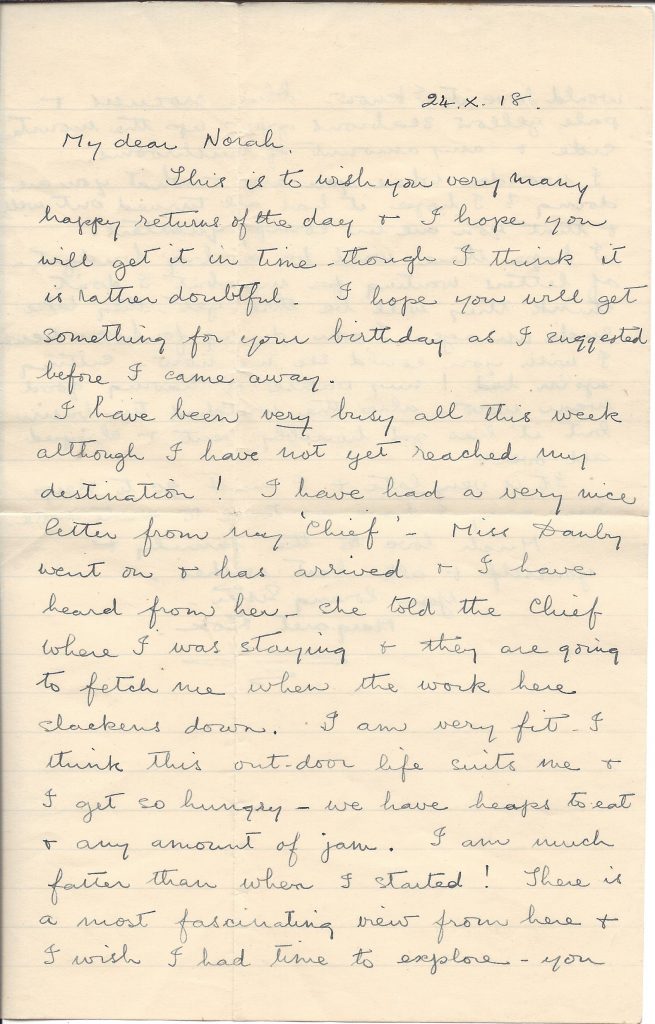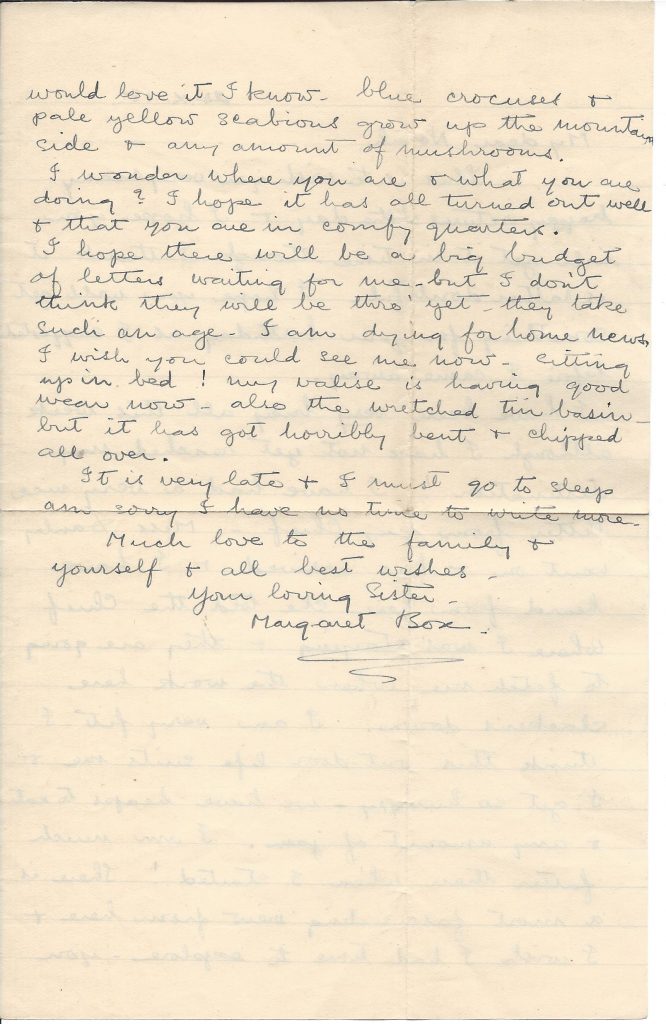My Great Aunt Norah Constance Box was 20 on 11th November 1918. Her sister, Margaret Ada Box who was nursing in Salonica and Serbia wrote to her on the 24th October, from a camp of the 708 Motor Transport Company to wish her a Happy Birthday. Although Margaret’s letter does not mention it, her diary shows she had stopped off at M.T. camp because many of them were sick with Spanish Flu, and three of her patients died that day. Margaret’s next letter, written to her parents when she rejoins her unit, describes her journey as ‘I have enjoyed every bit of it – it was very eventful’ – I suspect she is dissembling about the enjoyment, as the entry about that letter has some extracts from Margaret’s diary.
My dear Norah
This is to wish you very many happy returns of the day & I hope you will get it in time – though I think it is rather doubtful. I hope you will get something for your birthday as I suggested before I came away.
I have been very busy all this week, although I have not reached my destination ! I have had a very nice letter from my ‘Chief’ – Miss Danby went on & has arrived & I have heard from her. She told the Chief where I was staying & they are going to fetch me when the work here slackens down. I am very fit, I think this outdoor life suits me & I get so hungry – we have heaps to eat & any amount of jam. I am much fatter than when I started ! There is a most fascinating view from here & I wish I had time to explore – you would love it I know. Blue crocuses & pale yellow scabious grow up the mountain side & any amount of mushrooms.
I wonder where you are and what you are doing ? I hope that it has all turned out well & that you are in comfy quarters.
I hope there will be a big budget of letters waiting for me, but I don’t think they will be thro’ yet – they take such an age. I am dying for home news. I wish you could see me now. Sitting up in bed ! My valise is having good wear now – also the wretched tin basin – but it has got horribly bent & chipped all over.
It is very late & I must go to sleep, am sorry I have no time to write more.
Much love to the family & yourself & all best wishes
Your loving sister
Margaret Box
Notes
708 Motor Transport Company
 BRITISH FORCES IN THE SALONIKA CAMPAIGN 1915-1918 © IWM (Q 32741)
BRITISH FORCES IN THE SALONIKA CAMPAIGN 1915-1918 © IWM (Q 32741)
The picture above is the 689 Motor Transport Company, rather than the 708, but I assume they would have been similar. Both have very similar entries on the list of Army Service Corps Units on the Salonica Campain Society website.
Douglas Walshe was an officer in the 708 Company M T, ASC, a Light Supply and Ammunition Column of Ford vans attached to the Serbian Army. His book With the Serbs in Macedonia is available online at archive.org. His book mentions several encounters with Scottish Women’s Hospitals, but I did not find anything which could be pin pointed as this particular camp.


I hadn’t realised that Norah’s 20th birthday coincided with Armistice Day – no real clue in this letter that the war would end shortly.
The use of women drivers – ‘chauffeurs’ during the war is interesting. My understanding is that in the early years of motoring it was a popular activity for ladies (with money) to become interested in, as there was no ‘inherited’ cultural sexism regarding being a motorist. As a lady, one would almost always have had someone to drive your carriage but the arrival of cars meant a greater freedom to do your own thing. There were several clubs and associations for women motorists and some garages set up by women. Lady Gertrude Crawford (nee Molyneux) was one such motorist and was also the first Commandant of the Women’s Royal Air Force. https://en.wikipedia.org/wiki/Gertrude_Crawford
She also ran a garage with another lady.
So, possibly the motorist ladies were also those recruited as chauffeur drivers in the war?
I did a little looking in to Augusta Louisa North, who came and picked up Margaret on October 27th, as a random Chauffeur. She does indeed turn out to be the Great Granddaughter of William Keppel, 4th Earl of Albemarle (with other posh ancestors). I believe only medical personnel were paid at the Scottish Women’s Hospitals, so the chauffeurs would have needed to have independent means.